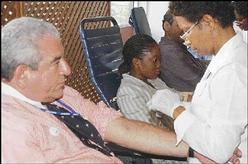
Nurse Beverly Mullings-Parke, Sister in charge of donations at the Blood Bank, prepares Dr. Manuel Peña, the Pan-American Health Organisation's (PAHO) local representative to donate blood during yesterday's blood drive at the Ministry of Health/PAHO offices on King Street in downtown, Kingston. - Junior Dowie/Staff Photographer THE NUMBER of units of blood being collected annually by the local Blood Bank is five times lower than standards recommended by organisations such as the World Health Organisation (WHO) and the Red Cross, health officials revealed yesterday.
Speaking at the launch of a new volunteer blood donor initiative, Pan-American Health Organisation (PAHO) representative, Dr. Manuel Peña, said Jamaica is currently collecting 25,200 of the recommended 130,000 units of blood it should collect per year.
"According to the WHO and the Red Cross, to meet its needs, a country should collect units equivalent to five per cent of its population. In the Americas, only Cuba reaches its percentage. The United States and Curaçao each reach four per cent and the majority of countries in the Americas barely reach 1.5 per cent," Dr. Peña said.
Head of the Blood Bank, Dr. Lundie Richards, said only 10 per cent of donors are voluntary, as most donors give blood only when a loved one is to enter hospital and, among those who volunteer to donate, 25 per cent are turned away because of low iron/haemoglobin count in the blood. Many more cannot donate because of their history of high-risk behaviour.
Daily inflows into the Blood Bank have been steady since the March 19 launch of the national voluntary blood donor programme, but that the bank is only collecting 2,100 units a month, half of what it needs, he said.
VOLUNTARY INITIATIVE
To boost the low donation record, PAHO, the Ministry of Health and the Blood Bank have launched the new voluntary initiative, under the theme 'One love, one blood, partnership for life'.
The voluntary programme is to cost between $7 million and $10 million and, according to Dr. Richards, about $3 million to $5 million will come from the World Bank, through the National HIV/AIDS/STI prevention and control programme. Various companies are donating their services.
Health officials also held a blood drive on the ground floor of the Ministry of Health's and PAHO's King Street offices in downtown Kingston.


























